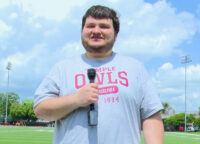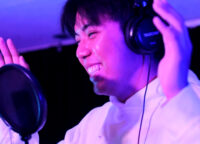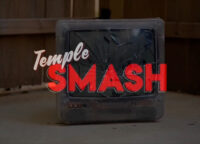
TUTV is working with some recent Klein College of Media and Communication graduates this summer to bring you the TUTV Alumni Spotlight. This feature will shed light on who these alumni are and how the Klein College of Media and Communication at Temple University helped them to achieve their goals.
This month, our spotlight is on 2020 KLN graduate Qadree Fletcher (he/him), APC Operator (Technical Director)/DOC Technician (Digital Operations Center) at NBC10 Philadelphia. Qadree started as an Intern in 2019, got hired as a Production Assistant within six months, and was promoted to APC Operator/DOC Technician in less than two years.
How did your experience at Temple University, and more specifically Klein College of Media and Communication, prepare you for a career in media and communication?
- I think I was incredibly lucky to have great professors and mentors like Peter Jaroff, Paul Gluck, and George Cummings. I got to work with all three of them throughout my four years at Temple through Temple Update and other TUTV shows, and I have taken so much of what they taught me and applied it to my career. They all created a culture of inclusion and expectation of excellence that motivated my fellow crew members and classmates to do our best work.
Are there any specific courses or extracurricular activities that you found most beneficial in developing your skills for your current position in the media industry?
- I volunteered for Temple Update during my college career and took Temple Update Practicum during my sophomore year. It was undoubtedly one of the hardest courses I took during my time at Klein College. I pulled plenty of all-nighters, working to meet deadlines for news packages and other projects. There were several times I wanted to grab Peter Jaroff—Temple Update’s faculty advisor and the practicum’s professor —and shake his shoulders while asking, “What more do you want from me, man?” That class helped me tremendously, though. It taught me how to be a better content creator, writer, and time manager. I also want to shout out George Cummings’ Sports TV Practicum, which produces the TUTV show Temple Athletics. I never took Paul Gluck’s TUTV practicum course, but I substitute taught in Paul’s place for two months last year, and it was so much fun. Oh, do yourself a favor, and please take Amy Caples’ Senior Seminar course. I learned so much valuable information right before graduating, and she’s just awesome.
Can you share any valuable internships or networking opportunities you pursued while at Temple University that helped you establish connections and gain relevant media industry experience?
- It’s so funny how things work out. Temple was the only college I applied to and was accepted to, and NBC10 Philadelphia was the only place I interned at during college, and it turned into a full-time job. I was passed over after my first time applying for the internship, then a year later, I received an out-of-the-blue call from my would-be internship coordinator Sara Smith, the then-social media specialist at NBC10. She had an opening and asked if I was still interested. We had only had one phone interview one year prior, but she remembered me thanks to my fellow Temple Update alum Dan Ray, now an Emmy-winning photojournalist, who was interning for Sara at that time. I interned at the station for five months, then as a production assistant for another year and a half. In October 2020, amid the height of COVID-19 and many employee retirements at my station, I was given an opportunity to become a technical director. I also began working in the station’s DOC (Digital Operations Center) in January 2021. I’ve worked both jobs since. I was hired as a full-time employee in 2022. I’ve also spent nearly ten years working as a director and crew member in the control room at Enon Tabernacle Baptist Church, the largest Black church in Philadelphia.
What is the most significant advice you have for current students interested in pursuing a career in media and communication?
- My advice to current students pursuing careers in the media is to have a goal and do something about it. It can be a vague goal, a small goal, or a seemingly unachievable goal. You can start a podcast or work toward a position in a student organization. Just be passionate about something and put forth the effort to make it tangible. You’ll thank yourself. Also, it’s a good idea to have working knowledge of operating a camera, setting up lighting, formatting a script, and editing (Premiere Pro, Photoshop, Audition, After Effects). Also, ‘networking’ is an annoying buzzword, but it is also a necessary part of building working relationships and friendships, which are so beneficial.
Are there any particular skills or areas of expertise they should focus on?
- It’s a good idea to have working knowledge of operating a camera, setting up lighting, formatting a script, and editing (Premiere Pro, Photoshop, Audition, After Effects). You don’t have to be a graphic design prodigy to make a simple lower-third or flyer in Photoshop, and just a small amount of effort can elevate the production value of your project immensely, increasing its value as a product and your value as a content creator.
In your current role, what are some of the biggest challenges you face in the rapidly evolving media industry, and how do you stay ahead of the curve?
- My job as an APC Operator (Technical Director) perfectly exemplifies the marriage of old and new production techniques and technology. APC stands for “automated production control” because we utilize robotic cameras and a virtual switcher paired with software to execute our newscasts at NBC10. Ostensibly, during newscasts, my job is that of technical director, audio engineer, camera operator, etc. While “punching” a show in the control room, I am responsible for switching between cameras and graphics sources, adjusting shots, and spotting and fixing mistakes, whether they make it on-air or not. Embracing new technology is an intrinsic part of my job. Last year, we began using a voice-activated teleprompter, which moves automatically when anchors say the words displayed on the prompter. It also uses A.I. technology to learn our anchors’ voices and speech patterns to better predict the speed at which each of them will read copy. I also work as a DOC Technician (master control operator) in addition to my APC Operator duties, which involve establishing live shots for our newscasts. During most of my time at Temple Update, we used Skype to transmit live shots, later switching to Live-U, which we also use at my job. We also use microwave transmission to dial in our news chopper, SkyForce10. Before working in the DOC, I had only ever used a microwave to ruin my leftovers. While many TV stations have switched all of their live shot and chopper transmission to cellular bondage technology (Live-U, Dejero) use our microwave receivers nearly every day. Eventually, we may also forgo our microwave sites and solely use cellular bondage, but our current workflow proves that the use of older equipment does have its place in a modern newsroom, sometimes right alongside the technology that has been designated as its replacement.





